Five scenarios of how the history of World War II could not change
... Although both of them, to put it mildly, sin with stretch marks, it is sometimes interesting to attach them to specific events: the results can be quite unusual.
Germany chooses invasion of the UK, not an attack on the USSR
Despite the overwhelming superiority of the British fleet over German, the idea of an amphibious operation in Britain was quite real. The clumsy-looking German dive-bombers in the summer of 1940 forced the British to delay warships at a considerable distance from the English Channel, so there was nothing to stop the first wave of German landing. In the first few days, according to post-war British estimates, any significant forces of the English fleet simply would not have time to approach the landing areas. Certainly, Germany did not have enough airborne assets, which would make the buildup of German forces difficult, but these problems faded against the backdrop of the state of the armed forces of Great Britain.
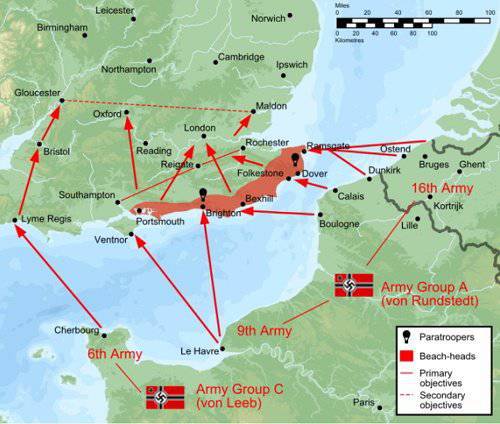
Yes, during the evacuation of Dunkirk hundreds of thousands of soldiers were rescued, except that weapon they were left on the French coast. Someone Churchill, speaking in parliament on June 4, 1940, covering his microphone with his hand, quietly informed the silent members of the House of Commons: "We will beat beer upstairs on the heads, because, perhaps, we only have this." In fact, that summer in the country there were barely 500 field guns of all types, a couple of hundred cannon tanks and less than a thousand fighters and bombers. Briefly: one or two German tank divisions and three infantry divisions were more powerful than all the "armed" forces in Britain by the middle of the fortieth summer, and the German shock aviation She was three times more superior than English in the very fact of the presence of Ju 87. That is, the chances of success were, and certainly, as we now understand, not lower than when choosing the option of attacking the USSR.
At first glance, if the German “Sea Lion” succeeded, the history of the Second World War had to change seriously. The German grouping on the Soviet borders in 1941 would have been stronger (aviation), and lend-lease supplies to the USSR would have been more modest at first. Nevertheless, the consequences should not be exaggerated: the German naval blockade would not go away, just like the British troops in the colonies. Even in our version of history, by occupying Iran in the summer of 1941, the Allies had the opportunity to supply the USSR with what it lacked. Yes, it would not have been possible to keep the North African front, but this could hardly have influenced the course of military operations in the East: where a couple of hundreds of divisions did not succeed, it is unlikely that another three or four will change anything.
Ultimately, the USSR (in theory) would have won the land war, although it would undoubtedly end it far to the west of the borders of the GDR and Czechoslovakia. Nevertheless, “from the point of view of eternity,” this would have changed little: the collapse of the Soviet bloc at the end of 1980 didn’t happen because of its small size, so apart from a few increased Soviet losses, this scenario would be little different from the one realized practice.
Now forget all the above: in this way the history of events could not change at all. "It was impossible to decide on the landing in England, prepared to the smallest details," said Yodl at the Nuremberg trials. “No one could take responsibility and allow the German armed forces to bleed to fight for England in the face of the upcoming struggle with the Soviet Union.” “Sea lion,” admits the US Navy Adm. W. Enzel agrees with him on 1970, “he did not jump, not because he was not capable of it. The point was to prepare the war with the USSR. Like a mighty magnet, Russia eventually pulled Hitler down. ”
And it is not only that the Germans “would have bled to death,” that is, they would have suffered great losses during the landing. It is hard to imagine that Stalin, folding his arms over his chest, would have watched Hitler occupy Britain, without organizing his version of Operation Unthinkable. If allies in the 1945 year decided to draw up a plan for an attack on the Soviet units in Eastern Europe, then why couldn’t Comrade 1940 be able to do this? Stalin, especially since he could not have had a better chance than during the invasion of the Germans in England.
Japan does not attack Pearl Harbor
Such a scenario certainly could not affect the course and outcome of the war, right? In fact, Hitler would have no formal reason to declare war on America, the United States could not (isolationism!) Fight shoulder to shoulder with Britain in the West. Consequently, the British, at best, until the end of the war, would have driven Rommel along the sandbox of North Africa, without thinking of landing in France. For Western countries, the war could have ended with the Soviet troops on the Rhine (Seine?), And for the USSR, the losses would have been clearly higher due to the smaller binding of the German armies in France in 1944 year.
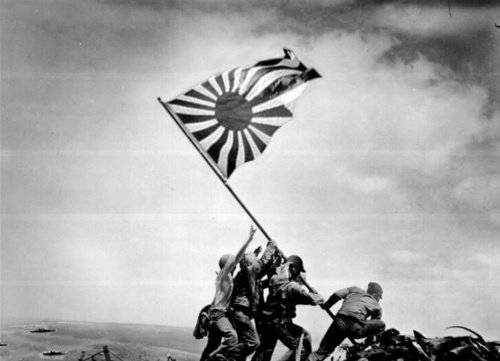
And no. This whole scenario comes from a single assumption: the United States could not be the first to attack Japan, and if it had not attacked the American bases first, it would have remained out of war. The problem with this tacit assumption is that even a democratic country does not always need enemy aggression to enter the war.
Even before the Second World War, the United States prepared plans for an offensive war with Canada, Great Britain and other Australian countries that had joined (War Plan Red). Perhaps these plans were born from nothing to do? We would not have put money on it: the British didn’t have the same “plans”, and before joining the Second World War the American armies in the XX century more than once, not two and not ten, turned out to be outside their own country, and in most cases even without congressional approval.
Of course, plans for a war with Britain, Germany, and even Portugal (!), Drawn up by the American military, were not considered the most likely scenarios of military actions. As such, the armed struggle against Japan, including the offensive, was considered. And if for this it was necessary to get the support of the population, it did not present much difficulty: there could be quite a lot of methods of drawing into military conflicts.
Recall the facts: in July 1941, the United States occupied Iceland under the pretext of protecting the island. Of course, it is difficult to say from whom it was necessary to protect it (the Germans, of course, lacked other opportunities to foolish their few ships), but nothing prevented in the same way — without any congressional sanction — to protect the oil-producing Dutch East-Indies (Indonesia) ), for the sake of which the Japanese in the 1941 year, in fact, started the war in order to receive for their ships the very oil which the American embargo did not allow to buy with money.
By defending the East Indies, the United States would have made its involvement in the war with Japan inevitable, regardless of the congressional position. Guided by similar considerations, the Japanese command launched a simultaneous attack by American and British forces in the Pacific: the US’s formal neutrality did not deceive anyone, since it was obvious that it could be circumvented by simple military-diplomatic techniques. Without attacking Pearl Harbor in December 1941 of the year, the Japanese would simply have had to attack him a bit later — and this would hardly have had a serious impact on the course of history as a whole.
Germans take Moscow and all
In Western historiography, as well as in the post-Soviet Russian, you can often hear about some fatal mistakes committed by Hitler in the 1941 year. In particular, having postponed the attack on the USSR in June instead of May because of the attack on the Balkans in the spring, he lost his chance to seize Moscow in 1941, which could lead to the implementation of the Barbarossa plan. And further on, in the same vein: for some reason he wanted to close the southern flank from the blow, turning troops there from the Moscow direction, and other memoir variations on the theme “Hitler as a Trojan donkey of Bolshevism”.
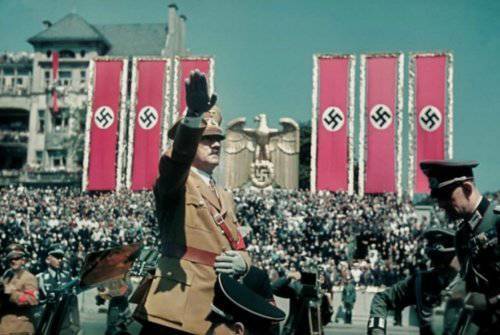
The trouble with this approach is that it ignores the very essence of this “Barbarossa”. Germany was planning a war with the USSR at about the same conceptual level, as if preparing for war with the marching Wells Martians. To know how to fight, you need to imagine the "device" of your opponent, his strengths and weaknesses. Meanwhile, until 22 June 1941, the Germans did not know the strengths of Soviet Russia, but the weak imagined themselves to be a little ... fantastic. According to the apt remark of the historian M.Yu. Meltyuhova, in the West there was an opinion that the population of Bolshevik Russia is “barbarians, and it is quite obvious that they can hardly oppose the Germans”. And if so, then the Soviet armed forces are something like a horse-mechanized detachment of the Papuans, and the USSR itself is a very backward country.
The head of one of the German intelligence agencies described the Nazi elite’s views on the level of development of its eastern neighbor: “Kanaris also claimed that he has impeccable documents that Moscow, which is a major industrial center, is connected to the Urals, which is rich in raw materials, only one single-track iron expensive".
At this level of operational planning, it is not surprising that the whole Barbarossa is made up of phrases like this: “Capturing this city [Moscow] means not only decisive political and economic success, but also the loss of the most important railway junction”. That is, after the occupation of this “attack”, the “Barbarossa” plan did not even suggest any other offensive operations. In fact, if the Papuans have only one single-track road connecting the capital with the industrial center, how can they continue the war when they lose this one-track?
Accordingly, German planning for a war with Russia was to some extent built on sand. Even in the case of the capture of Moscow, a decisive victory would not have brought it. De facto, behind the capital of the Papuans, there was not a single-track railway, but a fully developed transport network, and the fall of Moscow in this sense would not have led Germany to victory. Neither we, nor anyone else knows why German intelligence gave “these fantastic predictions” (Meltyukhov), but the fact remains that, based on this unscientific fantasy, you cannot build a plan for a successful fight, and the Germans would manage to capture 1941 Moscow or not - in principle, the moment is not very significant.
You cannot succeed in a war with the strongest land army of the world, if you assume that you are going on an expedition against the barbarian Mongolian-Bolshevik scum, whose picture of life your intelligence draws in the strokes of single-track Transsibs.
The Red Army drowns the Allies in the English Channel
And now about fun. According to the remarkable British military historian Anthony Beevor, at the end of the war, Stalin seriously considered the possibility of capturing the whole of Europe by pushing 85 allied divisions from 4 million personnel into “French waters”. Technically it was possible: the Allies struggled to overcome the resistance of small second-rate German units in the West, and they would hardly ever succeed if the German forces were equal to the Anglo-American one. In theory, the much larger Soviet army, hardened by longstanding battles with the best German units, could certainly inflict a series of lightning strikes of great strength.
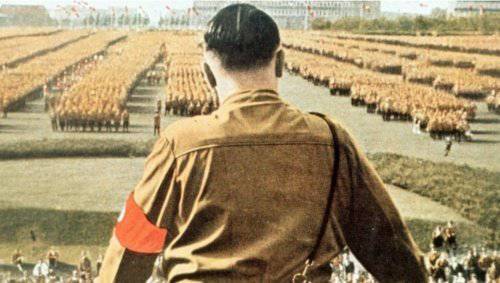
“Well, here you will not get out,” the reader will say. “It would change the course of history!” True, if it were not for one “but”: Stalin knew in detail about the development of a nuclear bomb. In the Manhattan project there was a strong mole, and not just one, and in this context the decision to attack the West, which was completing work on the atomic bomb, was very unwise. Up until the middle of 1945, it was not clear how many bombs the United States would be able to make per year, and not a single leader inclined to think in the style of Stalin would take such a step. That is exactly what happened, which makes the Beevor script - not based, of course, on any documents of the Soviet military planning, since no one has seen such documents - is relatively unrealistic.
Churchill starts the Third World in July 1945
Well, of this you, of course, heard. Due to Mr. Churchill’s understandable prejudices against the USSR in particular, and of the Western world as a whole, the British prime minister instructed his military to work out a remarkable idea: take July 1, take the Soviet forces on Germany’s territory suddenly and 1945. On the main, Dresden, 47 from 100 of potentially accessible American, Canadian and British divisions were to be used.
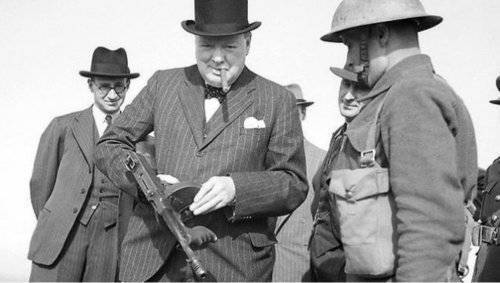
Of course, the Allies proposed to use significant forces of the Wehrmacht (“up to 100 000 people”), although, of course, it was not completely explained on what ideological basis. The purpose of the attack, according to the plan of the operation “Unthinkable”, was “to impose on the USSR the will of the USA and the British Empire” on the post-war reconstruction of Eastern Europe.
In theory, the implementation of this cute plan would really dramatically change the post-war reality. Our country would be involved in a war that could not win, since there was not a worthy mention of the fleet or a nuclear bomb in the Soviet arsenal and could not appear for several more years.
However, we are not impressed with the reality of this alternative. Plan "Unthinkable" is conceptually a twin brother of "Barbarossa". How is it in Comrade. Meltyuhova: "Barbarians, and it is clear that they can hardly oppose the Germans [allies] with them." In the sense that the success of the strike, scheduled for July 1 1945, was real in only one case: if one American / British managed to chase four Soviet soldiers, and one Sherman two or three T-34-85. In other words, we have another war plan with walking Wells Martians tanks.
By the way, the military, who were instructed to draw up a plan, showed more sobriety than their German predecessors in 1940 year. The headquarters noted that even a temporary success of an event can only have a complete surprise, and even then nothing is guaranteed. Therefore, by 22 May 1945, they classified Operation Unthinkable as “risky.”
In our opinion, this is a brilliant analytical success of the British military, which clearly puts the British strategic thought of the 20th century to a height unattainable for its German rival. Stop talking, talk? In fact, we are extremely serious: before the Second World War, no country in the world could even come close to properly assessing the prospects for the German war in the East. The fact that the British planners of the Third World did not repeat this failure is worthy of the highest praise. It was their pessimistic assessments that ultimately formed the foundation of the first relatively real post-war plans of Western countries for the opposition to the USSR - plans that were based on the recognition of the impossibility of military success without using nuclear weapons. And it may well be that only an awareness of the real capabilities of the Soviet armed forces gave Europe the years following the 46 war.
Information